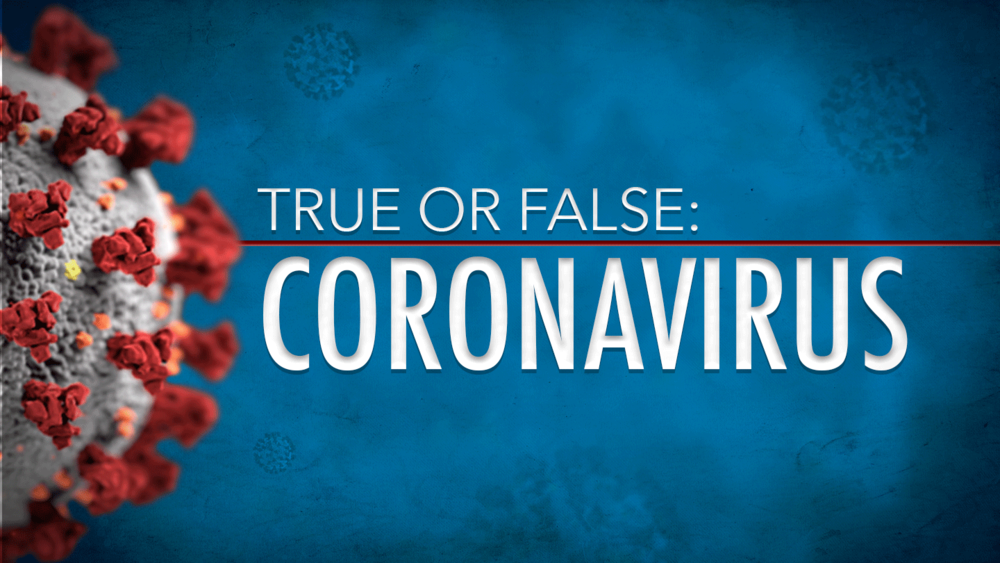Section Branding
Header Content
True Or False: Zinc Lozenges Keep Coronavirus At Bay
Primary Content
As efforts to contain the coronavirus continue to ramp up across the country, rumors and false information also continue to spread. In an effort to separate the falsehoods and half-truths from the facts, we have started a new column Coronavirus: Fact or Fiction to address some of the most pressing questions and concerns.
1. If you feel sick, start taking zinc lozenges and it will help keep the coronavirus at bay.
FALSE Though there have been some studies that found zinc supplements can help diminish the length and severity of the common cold, there is no evidence that zinc will help with the symptoms of COVID-19.
2. All kinds of household cleaning products will kill the coronavirus.
TRUE Hydrogen-peroxide, bleach, and alcohol-based cleaners (must be at least 70% alcohol) are effective at disinfecting surfaces that have come into contact with the Coronavirus. Vinegar in cleaning is not an effective way to destroy the virus. Soap and water are one of the most highly effective ways of breaking the virus cells apart.
3. A vaccine to cure the coronavirus is on the way soon.
FALSE Many countries and companies worldwide are working on vaccines. Verifying that a vaccine works and is safe is not a quick or easy process. The experts say it is unlikely a vaccine will be ready for mass use until the spring of 2021 at the earliest.
4. Gargling with bleach, essential oils or saltwater can prevent the coronavirus from entering your system.
FALSE. Never, ever gargle with bleach! At this time, there are no known liquids that you can gargle or otherwise ingest that will prevent the spread of COVID-19.
5. The coronavirus was invented in the U.S. and deliberately released in China to embarrass that country.
FALSE. Though there have been reports of Chinese officials trying to fuel this conspiracy theory, there is no evidence that this is true. Health officials say it is wrong to blame China or any other country for the virus. Viruses often migrate from one species to another in a way that is unpredictable.
6. You are more likely to get the flu than you are to get the Coronavirus.
MOSTLY FALSE. It is still unknown how much COVID-19 will spread among the U.S. population but it is believed that this strain of Coronavirus is about twice as communicable as the flu. More importantly, there is no vaccine for COVID-19 while there are vaccines for most strains of the flu.
7. I can still safely donate blood or get a blood transfusion without worrying about the coronavirus.
TRUE. There is no evidence that COVID-19 or any other respiratory virus can be transmitted through blood. You can donate blood without the fear that it will raise your risk of getting the virus.
8. Children and young adults can’t catch the coronavirus.
FALSE. You can catch the virus at any age. That said, it appears children may be somewhat less likely to develop serious conditions than older adults aged 60 and over whose immune systems aren’t quite as robust. Those with compromised immune systems and chronic illnesses are also more susceptible. There is still a lot of research being done in this area, but the bottom line is that everyone needs to be concerned about catching and spreading this disease.
9. Taking Vitamin C supplements will help ward off the coronavirus
FALSE. There is no evidence that Vitamin C or any other supplement will prevent you from catching the coronavirus. That said, Vitamin C promotes a healthy immune system and is an essential part of a healthy diet so taking supplements or eating and drinking foods with Vitamins C is generally considered a good idea.
10. You should avoid taking ibuprofen (the medicine in Advil) if you get the coronavirus?
MOSTLY FALSE. Health experts are somewhat conflicted on this issue. France’s Health Minister says his country has found evidence that taking ibuprofen to combat the fever associated with COVID-19 can actually make the disease worse. But, the WHO and other health organizations say they have not seen any evidence that ibuprofen is problematic. Research on this is ongoing. If you are concerned, you may want to use acetaminophen, the drug found in Tylenol, instead.
SOURCES
- https://www.mcgill.ca/oss/article/health/can-zinc-lozenges-help-coronavirus-infections
- https://www.nbcnews.com/better/lifestyle/many-common-household-cleaning-products-can-kill-coronavirus-if-you-ncna1160271
- https://www.theguardian.com/world/2020/mar/17/when-will-a-coronavirus-vaccine-be-ready
- https://www.hopkinsmedicine.org/health/conditions-and-diseases/coronavirus/2019-novel-coronavirus-myth-versus-fact
- https://www.marketwatch.com/story/inside-chinas-campaign-to-blame-the-us-for-the-coronavirus-pandemic-2020-03-15
- https://www.livescience.com/coronavirus-myths.html
- https://www.redcross.org/about-us/news-and-events/press-release/2020/red-cross-media-statement-on-2019-novel-coronavirus.html
- https://www.livescience.com/coronavirus-myths.html
- https://www.livescience.com/coronavirus-myths.html
- https://www.npr.org/sections/health-shots/2020/03/18/818026613/advice-from-france-to-avoid-ibuprofen-for-covid-19-leaves-experts-baffled

